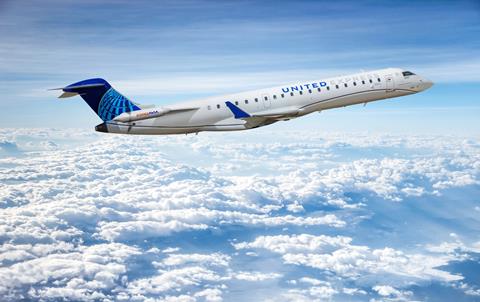
Up to 100 zero-emission, 100% hydrogen-electric engines could be used on United Express regional aircraft by 2028.
United has taken an equity stake in hydrogen-electric engine developer ZeroAvia that gives it the ability to purchase the ZA2000-RJ engines and, according to United, will make it the largest airline to invest in zero-emission, hydrogen-electric engines for regional aircraft with bellyhold capacity.
The engines could be retrofitted to existing United Express aircraft as early as 2028. The ZA2000-RJ is expected to be used in pairs as a new power source for existing regional aircraft.
Under an agreement with United Airlines Ventures, United will pursue a conditional purchase agreement for 50 ZeroAvia ZA2000-RJ engines, with an option for 50 more, enough for up to 50 twin-engine cargo-carrying aircraft which would be operated by United Express partners.
United has not disclosed whether its cargo arm United Cargo will benefit from the hydrogen-electric engines.
The investment is part of United’s efforts to reduce its Green House Gas emissions 100% by 2050 and could help the airline meet it green goals without relying on traditional carbon offsets.
“Hydrogen-electric engines are one of the most promising paths to zero-emission air travel for smaller aircraft, and this investment will keep United out in front on this important emerging technology,” said Scott Kirby, CEO of United.
On December 1, United operated the first ever passenger flight using 100% sustainable aviation fuel, from Chicago to Washington DC.
Earlier this year, United announced an agreement to purchase sustainable aviation fuel from Alder Fuels.
ZeroAvia completed the world’s first hydrogen fuel cell powered flight of a commercial-grade aircraft in September 2020. The company’s roadmap calls for it to develop hydrogen-electric propulsion for progressively larger aircraft.
ZeroAvia has already secured experimental certificates for two prototype aircraft from the Fedral Aviation Administration in the US and the Civil Aviation Authority in the UK and has passed significant flight test milestones.
Hydrogen-electric engines use electricity created by a chemical reaction in a fuel cell to power an electric motor instead of burning fossil fuel. Because no fuel is burned, there are no climate-harming emissions or carbon released into the atmosphere when the engines are operated.
https://www.aircargonews.net/airlines/united-first-to-fly-aircraft-full-of-passengers-using-100-saf/
https://www.aircargonews.net/policy/environment/dhl-global-forwarding-signs-up-for-uniteds-saf-programme/














